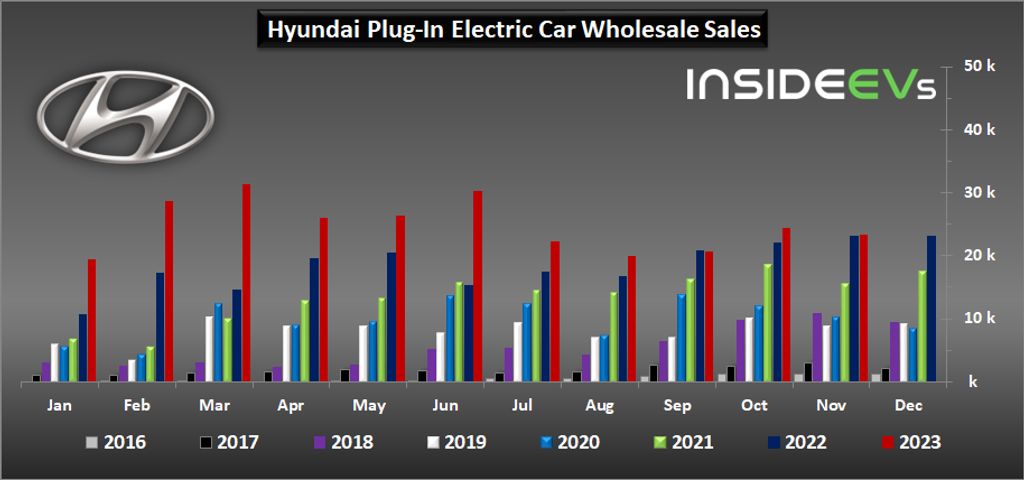Hyundai Motor Company (Hyundai and Genesis brands) global vehicle sales in November amounted to 365,576, which is 5.0% more than a year ago. Year-to-date, the company sold over 3.8 million vehicles (up 7.6% year-over-year).
Unfortunately, November did not bring any progress on the electrification front as the numbers were very similar to the ones from a year ago—actually a bit lower.
Last month, the combined wholesale shipments (which are closely related to production) of Hyundai and Genesis plug-in cars amounted to *24,149 (down 3% year-over-year). We estimate that it is around 6.6% of the automaker’s total sales volume (compared to 7.1% a year ago).
*Retail sales in South Korea plus overseas sales (based on wholesales; at the manufacturer level), unaudited and on a preliminary basis.
The data indicates that all-electric car volume decreased by 3% year-over-year to 20,794, including 19,911 Hyundai BEVs (up 0.2% year-over-year) and 883 Genesis (down 46% year-over-year). Plug-in hybrid car volume also remains stable at 3,355 (up 0.7% year-over-year).
An interesting finding is that the wholesale shipments of the E-GMP-based Hyundai and Genesis cars in November decreased by almost 13% year-over-year to 13,137 (it was the third consecutive small drop year-over-year). That’s also less than in the case of the record-high result of the sister brand Kia, which noted 16,916 E-GMP-based cars (up 118% year-over-year).
The last three months did not bring any significant growth in BEV sales for Hyundai, and the results are not as good as in the first half of the year. It will be very interesting to see whether the fast growth will return in December or in early 2024.
In terms of retail sales, things might still be positive (retail sales usually lag behind wholesale sales), as Hyundai Motor reports more than 16,000 all-electric car sales in November.
Wholesale plug-in car sales last month (YOY change):
- BEVs: 20,794 (down 3%) and 5.7% share
Hyundai BEVs: 19,911 (up 0.2%)
Genesis BEVs: 883 (down 46%) - PHEVs (Hyundai): 3,355 (up 0.7%) and 0.9% share
- Total plug-ins: 24,149 (down 3%) and 6.6% share
- FCVs (Hyundai): 234 (down 80%) and 0.1% share
So far this year, the plug-in electric car wholesale shipments exceeded 290,000, which is about 7.5% of the total volume.
Wholesale plug-in car sales year-to-date (YOY change):
- BEVs: 242,841 (up 40%) and 6.3% share
Hyundai BEVs: 224,826 (up 45%)
Genesis BEVs: 18,015 (up 2%) - PHEVs (Hyundai): 47,897 (up 12%) and 1.2% share
- Total plug-ins: 290,738 (up 35%) and 7.5% share
- FCVs (Hyundai): 4,472 (down 56%) and 0.1% share
For reference, in 2022 Hyundai Motor Company sold more than 240,000 plug-in electric cars (up 45% year-over-year), including nearly 195,000 all-electric (up 56%). The year 2023 is already much better, but the growth rate slowed down.
Hyundai brand

In November, wholesale shipments of the E-GMP-based models (Hyundai Ioniq 5, Hyundai Ioniq 6, and Genesis GV60) decreased by 13% year-over-year to 13,137.
The top three all-electric models in the lineup remain the same: the Ioniq 5, Kona Electric, and the Ioniq 6.
Top models (wholesale shipments) last month and YTD (YOY change):
- E-GMP BEVs: 13,137 (down 13%) and 167,869 YTD (up 53%)
- Hyundai Ioniq 5: 9,632 (down 5%) and 104,831 YTD (up 17%)
- Hyundai Kona Electric: 7,021 (up 22%) and 66,774 YTD (up 31%)
- Hyundai Ioniq 6: 3,190 (down 18%) and 52,953 YTD (up 416%)

The hydrogen fuel cell model — Hyundai Nexo — noted 234 units last month (and 4,472 YTD). Its sales fall quite significantly.
Genesis brand
The Genesis brand continued to struggle in the all-electric car segment, as its wholesale shipments amounted to only 883 units (down 46% year-over-year), which is the lowest monthly result since February 2022. The year-to-date volume is 18,015 (up 2% year-over-year).

Read the full article here


